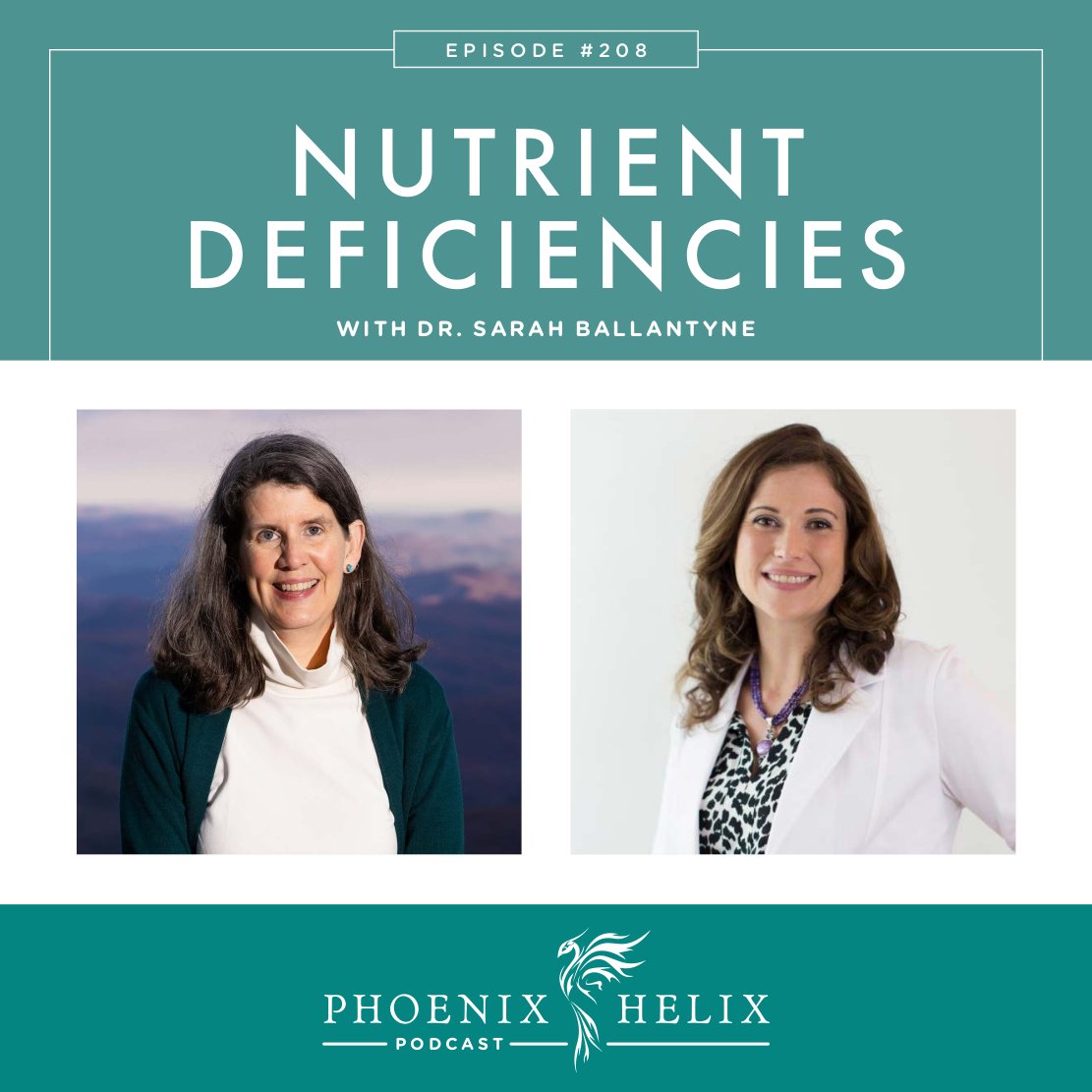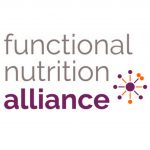What Nutrients Are Missing on Your Healing Diet?
When we develop autoimmune disease, our body becomes more sensitive and that often includes food sensitivity. Many of us turn to healing diets in an effort to eliminate inflammatory foods and embrace the foods that support healing instead. One risk, however, is paying too much attention to the foods we remove and not enough to the foods we add. Another risk is sticking to a dietary template without personalizing it for our body’s unique needs. There are lots of healing diets out there. We often talk about the Paleo Autoimmune Protocol and Wahls Protocol on this podcast. But other diets you may be familiar with include the Specific Carbohydrate Diet or GAPS Diet, the Low-FODMAP diet, a vegetarian or vegan diet, a ketogenic diet, or a carnivore diet. Today, we discuss which nutrient deficiencies are most common on which healing diets, and how we can make sure we’re getting the nutrition we need. My guest is Dr. Sarah Ballantyne. She’s a best-selling author, speaker, educator, and former research scientist, fascinated with the healing power of food.
Listen to the Show
- Subscribe to my podcast through your favorite podcast app: iTunes, Stitcher, Google, TuneIn, Spotify, Amazon, etc.
- You can also listen to the episode right here through the player below, and if you subscribe to my newsletter you’ll get notified of future episodes.
Podcast: Play in new window | Download
Show Notes
- Intro (0:00)
- Meet Dr. Sarah Ballantyne
- In addition to being an autoimmune warrior herself, Sarah is a best-selling author, speaker, educator, and former research scientist, fascinated with the healing power of food. You may know her as The Paleo Mom. She just launched a second website called Nutrivore.
- Other podcast interviews with Sarah:
- Announcement: New Phoenix Helix Website (3:25)
- I’ve been blogging for 10 years now and there’s a ton of content that I wanted to reorganize and make easier to find. Let me know what you think!
- Thank You to Our Podcast Sponsor – Captain Soup (3:53)
- Captain Soup sells nutrient-dense freezer meals, designed specifically to enable the body’s healing. They only use the highest quality ingredients including locally sourced, 100% grass-fed and finished meats, wild-caught seafood, 100% organic vegetables, and bone broth made in-house from the bones and organ meat from the best grass-fed lamb in the world.
- They sell 7 flavors of soup which are paleo, keto, and Wahls protocol-compliant. 5 of those flavors also fit the elimination phase of the Paleo Autoimmune Protocol. 4 of the flavors are Low-FODMAP. And 2 flavors are GAPS-compliant.
- Here are the flavors: Classic Lamb, Dijon Lamb, Italian Beef, Classic Beef, Dijon Beef, Green Machine & Tom Kha. (Tom Kha is a seafood soup that’s available in-season.) They also have the full ingredient list for every flavor on their website.
- You can buy pre-selected variety packs or build your own custom box. They also have a nutrient-dense liver pâté that can be substituted for any soup upon request.
- Order today and get nutrient density delivered to your doorstep! Use the code PHOENIX to save $25 off your first order.
- Sarah’s Diet Journey (5:35)
- Her first engagement with diet culture was 100% focused on weight loss. She didn’t know she had Hashimoto’s Thyroiditis which was causing the weight gain. She thought the problem was food and tried a wide variety of restrictive diets that either didn’t work, or didn’t work for long. She felt very defeated and developed a binge eating disorder.
- It wasn’t until she found the Paleo Autoimmune Protocol in 2011 that she learned a more balanced approach to diet that focused on nutrients rather than restriction. She took her research background and dove into the science of nutrition. Through the AIP, she shifted her goal from losing weight to gaining health instead.
- The AIP improved her physical health but also inspired deep emotional healing which included healing her relationship with food. She became part of the body positivity movement and threw out her scale.
- She discovered the word “Nutrivore” early in her AIP journey, and it’s why her writing has always focused on nutrient density within the Paleo Autoimmune Protocol. She sees an overemphasis of restrictions in diets, and instead wants to provide resources to help people personalize a deeply nutritious healing diet – not just within the AIP community but within other dietary templates as well.
- What Is a Nutrivore? (11:54)
- An herbivore eats plants, a carnivore eats meat, a nutrivore eats nutrients. So, a nutrivore is someone who chooses foods that supply all the nutrients their body needs to thrive.
- Sarah has developed a research-based, nutrivore scoring system. She delved into the nutritional science and was disappointed that most scoring systems based their numbers on how closely foods aligned with the USDA dietary guidelines, which aren’t always correct. Sarah wanted to focus on the actual nutrients within foods which can then inform guidelines. The index that matched her values most closely is the nutrient-rich foods index. But she wanted more information than that index provides, so she built her own. The challenge for all food indexes is a lack of data – some foods are more heavily studied than others. But based on the data available, she was able to score foods based on 32 nutrients, along with some additional “bonus” nutrients that aren’t measured as easily.
- Update 2023: The Nutrivore website is now live!
- The Paleo Autoimmune Protocol – AIP (19:42)
- Both Sarah and I have done a lot of education around nutrient density and the AIP. It’s not a healing diet if it’s not nutrient-dense. But depending on where people get their information, they may approach the AIP focused solely on removing foods without adding nutritious foods in their place. So, the first step to avoiding nutrient deficiencies on the elimination phase of the AIP (or any healing diet really) is to eat all the foods available within that dietary template with a focus on nutrition. (Resource podcast: Ep. 79 Nutrient Density.)
- That said, there are some nutrients difficult to get on the AIP even if you have a nutrient-dense approach. These are calcium and vitamin E.
- The best food source of calcium is dairy which is removed during the elimination phase of the AIP, and because dairy is a common food sensitivity, many people cannot reintroduce it successfully. AIP food sources of calcium are cruciferous vegetables and leafy greens (and the greens that bridge both of these categories like kale and collards are especially rich). This form of calcium is also very bio-available (easy for your body to absorb and use). Seafood is another source of calcium, especially if you eat the bones (like canned sardines). Some other foods that contain small amounts are figs, oranges, mushrooms, and blackstrap molasses. (Sarah actually has a spoonful of blackstrap molasses daily.) Finally, some mineral waters (like Gerolsteiner) are good sources of calcium, but they can be expensive.
- The best AIP food sources of vitamin E are avocado, olives, coconut, and seafood. There are also a few other foods that contain small amounts: chives, cinnamon, and certain berries. Then, during AIP reintroductions, if you’re able to reintroduce nuts and seeds successfully, many of those are good sources of vitamin E as well.
- Resources:
- When to Supplement (25:39)
- Vitamin D is a nutrient that often requires supplementation because it’s difficult to get enough through food or sunshine. However, testing is important to determine levels so you don’t take too much. (Resource: Ep. 179 – Vitamin D and Autoimmune Disease.)
- For other nutrients, testing can be helpful to see if you’re getting enough through diet. A conventional doctor can test for 8-10 nutrients, and some of those tests can be helpful but keep in mind that serum levels of things like calcium don’t reflect nutrient sufficiency. Instead they’re a marker of kidney function.
- The best test for nutrient sufficiency is SpectraCell. It’s an advanced test more commonly ordered by functional medicine physicians, but you can also order it yourself online. If your report shows slight deficiencies, those can likely be fixed through diet if you focus on the right foods. For deep deficiencies, supplements may be needed. It’s always best to work with your doctor when making these decisions.
- Thank You to Our Podcast Sponsor – Luminance Skincare (29:47)
- Today I want to highlight their bestselling facecare trio, which includes their Delicate Cleanser, Rosewater Toner, and Deep Hydration Moisturizer. Each one of these products has over 500 five-star reviews on their website. And they have a sample kit, so you can try it yourself! The Delicate Cleanser gently and deeply cleanses your skin without drying it out. The Rosewater Toner perfectly adjusts and balances the pH of your skin. The Deep Hydration Moisturizer mimics skin’s natural oils to soothe dry skin while maintaining a clear complexion.
- Whereas conventional skincare products are full of chemicals that can hurt our bodies, Luminance is made from ingredients that nourish. Their products are natural, organic, wildcrafted, non-GMO, and gluten-free (and they’re even made in a dedicated gluten-free facility). It’s the cleanest skincare anywhere! And everything is handmade in small batches within the United States.
- They have a complete face and body care line, including cleansers, toners, moisturizers, masks, acne serum, lip balms, haircare, sunscreen, handcrafted soaps, and more.
- Order their sample kit today, and once you fall in love and want to order full-size bottles, use the code HELIX for 10% off your order. (You can also use the HELIX coupon on any Luminance product, not just the facecare trio.)
- SCD & GAPS (31:24)
- These are low-starch diets that are designed to starve pathogenic bacteria and restore gut health. They are whole foods diets and very similar to paleo because they remove all grains and most legumes. However, they also remove a lot of the starchy vegetables allowed on the paleo diet. In the early stages of the diet, they incorporate a lot of soups because they’re easy to digest. They also recommend fermented foods for gut health.
- Sarah’s concern with these diets is the long-term impact on gut health. People feel benefits initially because the diets do successfully starve pathogenic bacteria, but they also starve beneficial bacteria. That can lead to worse health long-term.
- SCD & GAPS are also low-carb diets, and any low-carb approach can result in deficiencies in a wide variety of nutrients, including B2, B5, B6, folate, vitamin E, biotin, choline, calcium, chromium, iodine, iron, magnesium, molybdenum, potassium, and zinc. However, with careful food choices, you can get these nutrients on an SCD/GAPS diet, especially if you eat plenty of organ meat.
- The hardest nutrient to get on this diet is starch due to the nature of the diet itself, and Sarah believes starch is an important food group for the gut microbiome. Sarah’s recommendation is to eat plenty of the low-starch vegetables allowed, especially winter squash. And also make sure you’re getting enough carbohydrates overall. Ideally, only do these diets short-term under the guidance of a healthcare practitioner with the goal of reintroducing foods and expanding your diet as quickly as possible.
- Resources:
- Low-FODMAP (39:23)
- This is a diet most commonly prescribed to treat SIBO (Small Intestine Bacterial Overgrowth). It removes the vegetables that feed that overgrowth.
- SIBO experts now agree that SIBO cannot be cured through diet alone. Instead, the diet is recommended as a short-term intervention to reduce symptoms alongside medically supervised treatment that actually cures the overgrowth.
- Sometimes people do this diet independent from medical assistance and can get stuck on the diet. While it does reduce IBS symptoms short-term, it harms gut health long-term.
- Also, FODMAP vegetables contain some of the most well-researched nutrients for human health: cruciferous vegetables and allium vegetables. That’s why it’s important to cure the overgrowth and reintroduce these foods back into the diet.
- Resource:
- Elimination Diets Are Meant to Be Short-term (43:29)
- For the diets we’ve discussed so far (AIP elimination phase, GAPS/SCD, and Low-FODMAP), the deficiencies that arise on each diet are unique, but there is one thing they have in common. They aren’t meant to be lifetime diets. They have therapeutic potential in the short-term, but the goal should always be to reintroduce foods and widen the dietary template again. Otherwise nutrient deficiencies and health harms are very likely to develop long-term.
- If you can afford it, doing these diets under that guidance of a doctor or nutritionist is best, because they can make sure you’re getting the right nutrients and help troubleshoot any issues that arise.
- Resource: Healthcare Practitioner Directories.
- Thank You to Our Podcast Sponsor – Functional Nutrition Alliance (45:30)
- Full Body Systems is their internationally acclaimed, 10-month online functional nutrition immersion training program.
- It’s designed by world-renowned educator, Andrea Nakayama. Many of you know her as one of my most popular podcast guests. Her unique way of working with patients often leads to results where other practitioners hit dead ends. This program teaches you to do the same.
- If you’re already trained as a health coach, nutritionist, or medical practitioner and want to more effectively help your clients break through healing plateaus, this class is for you!
- And if you’re an aspiring practitioner just getting started, this might be the only training you need.
- You’ll gain detailed knowledge of all the systems in the body, how they interact, how problems develop, and how to personalize diet and lifestyle recommendations for each unique client.
- Enrollment is currently open. To learn more, visit FxNutrition.com/Eileen.
- Vegetarian & Vegan (46:51)
- People often have personal definitions for these terms, but generally speaking, vegetarians avoid meat and seafood but do eat eggs and dairy, whereas vegans avoid all animal products (including eggs, dairy, and honey).
- The nutritional challenge of these diets is that humans are omnivores who evolved to eat both plants and meat. There are some nutrients present only in plant foods and others present only in animal foods. If you remove all animal foods from the diet, supplementation of certain nutrients is required for health. Most vegetarians and vegans know this and in addition to taking certain supplements, they make sure to combine foods together (like rice and beans) to get a complete protein that isn’t present in these foods by themselves.
- The essential nutrients most challenging to get on these diets are vitamin A, B3, B12, folate, calcium, chromium, copper, iodine, iron, magnesium, manganese, zinc, and omega 3 fats. (Vitamin A in plants needs to be converted by the body before being used, and we only convert about 3% whereas vitamin A in animal foods is the active form and fully bio-available.)
- There are also some nutrients exclusive to animal foods that aren’t considered “essential” but have some wonderful health benefits. These include CoQ10, creatine, taurine, carnosine, and carnitine.
- Sarah believes in a food first approach to nutrition, so if you’ve chosen these diets for “health reasons” understand that over time, they can harm your health. Many people in the vegetarian community do embrace eating seafood (pescatarianism), and all of these nutrients can be found in seafood. In fact, seafood is more nutrient-dense than most meats, with the exception of organ meat. Also, you don’t need a ton of meat or seafood to meet your nutritional needs. Two 4-oz. servings daily is sufficient for most people.
- If you’re following these diets for religious reasons, be sure you work with a healthcare practitioner to test for nutrient deficiencies and supplement as needed.
- Resources:
- If you are vegetarian or vegan for religious reasons, The Wahls Protocol level 1 has a vegetarian version that focuses on nutrient density.
- If you chose vegetarianism/veganism for environmental reasons, this article may resonate: What Does It Mean to Be an Ethical Omnivore?
- If you’re considering pescatarianism, here are Sarah’s articles on the health benefits of fish and shellfish.
- Ketogenic & Carnivore (53:23)
- Ketogenic diets do have research-backed benefits for neurological conditions like epilepsy and multiple sclerosis.
- For other health conditions, Sarah doesn’t recommend a ketogenic diet. Adverse events are reported regularly in the scientific literature, and the risk of nutrient deficiency is just too high.
- Some ketogenic diets remove all plant foods (the carnivore diet). Other versions do allow some plants but need to restrict the amount to achieve ketosis. Just like meat, plants have essential nutrients that our bodies need, including potent antioxidant, anti-inflammatory, and anti-cancer compounds.
- The most common nutrient deficiencies on ketogenic diets are vitamin A, B2, B5, B6, E, K, folate, biotin, choline, calcium, chromium, iodine, iron, magnesium, molybdenum, potassium, selenium and zinc.
- There are also gut health risks to a ketogenic diet due to the lack of starch and fiber.
- The carnivore diet has similar problems to a vegan diet. Humans have evolved to be omnivores, and both plant foods and animal foods have essential nutrients we need to thrive. Removing all plant foods may resolve symptoms short-term if there’s gut dysbiosis, but will lead to health harms long-term.
- If you choose a ketogenic diet, here are two nutrient-dense approaches that Sarah recommends, but with the caveat that they should only be done under medical supervision.
- The Wahls Protocol Level 3.
- Mediterranean Keto Diet.
- Sarah never recommends the carnivore diet.
- Joy as a Nutrient (1:00:45)
- There are a lot of emotions surrounding food, especially on a healing diet. We may feel grief over foods “lost” that trigger inflammation, or anxiety around trying new foods out of fear they will do the same. How can we make sure joy is part of every meal, no matter what diet we follow?
- Tip #1: Patience. If our prior diet was full of packaged foods, those are designed to manipulate the reward centers of our brains. They contain high quantities of salt/sugar/fat plus artificial flavor enhancers that make us crave more of those foods. In contrast, real whole foods may not taste as good until our brains and taste buds adapt. The good news is that happens after about 4 weeks on healing diet, and real food will become delicious.
- Tip #2: Find the foods on your healing diet that you love. Try new recipes and new ingredients. Seek out popular cookbooks for your diet. Be adventurous in the kitchen. In time, you’ll gather a favorite selection of recipes you love, and some of them will be fast and easy, while others you’ll save for special occasions. No matter what healing diet you follow, it can be delicious!
- Tip #3: Food reintroductions. Whatever healing diet you follow, don’t get trapped in its most restrictive form. Eat as wide a variety foods as you can within that template, and when the time is right, go through the reintroduction process to personalize and expand your diet. Research shows that food diversity has a huge beneficial impact on health. Reintroductions expand nutrition, flavor, joy, and food flexibility for restaurants and travel. Reintroductions are an important part of a healing diet.
- Tip #4: The mind-body connection also has a huge impact on autoimmune health, and there are mindset practices that not only help us digest food better but also bring more joy to our lives.
- Resources:
- Outro (1:09:04)
- Sarah’s first website is called The Paleo Mom. Her newest website is called Nutrivore. There you’ll find lots of free information to avoid nutrient deficiencies, and she also offers digital nutrivore resources (including an ebook and weekly serving matrix). She’s also very active on social media: Instagram, Facebook, and TikTok.
- Eileen (your podcast host) is the author of multiple books, written to help people thrive with autoimmune disease. Learn more on the Books Page.
- If you like this podcast, follow or subscribe through your favorite podcast app. You can also subscribe to Eileen’s biweekly newsletter.
- Check out the entire archive of podcast episodes.
You May Also Be Interested In
Spreading the Word
If you like the podcast, please leave a positive review in iTunes. It would mean the world to me, and also helps others find the podcast. Here are some quick instructions using your iPhone:
- If you are already subscribed to my podcast: (1) Click the purple podcast icon. (2) At the bottom of the screen, click Library. (3) At the top of the screen, click Shows. (4) Click the Phoenix Helix podcast image. (5) Scroll down the page, and you’ll see Ratings and Reviews. Scroll down a little bit more and click on Write a Review. This will bring up the review screen. Tap 5 stars (if you love the podcast), and then click in the title box, and it will bring up the keyboard. Enter a title and short review. (6) Click Send in the upper right corner. (7) Thank you! Positive reviews give the podcast a higher search ranking in iTunes, helping people find it and letting them know it’s a quality podcast and worth their time to listen.
- If you haven’t subscribed to my podcast: (1) Click the purple podcast icon. (2) In the lower right corner, click the magnifying class. (3) Type Phoenix Helix in the search box. (4) Click the podcast cover in the Show list. (5) If you’d like to subscribe, click the + sign at the top of the screen. (6) To write a review, scroll down the page, and you’ll see Ratings and Reviews. Scroll down a little bit more and click on Write a Review. This will bring up the review screen. Tap 5 stars (if you love the podcast), and then click in the title box, and it will bring up the keyboard. Enter a title and short review. (7) Click Send in the upper right corner. (8) Thank you! Positive reviews give the podcast a higher search ranking in iTunes, helping people find it and letting them know it’s a quality podcast and worth their time to listen.








